 Propane Gas – A Short Course
Propane Gas – A Short Course 
 Propane Gas – A Short Course
Propane Gas – A Short Course 
By Gary Motley
Master Certified RV Technician
The Propane (Liquefied Petroleum) Gas system is one of the most important systems in a recreational vehicle. It is also one of the least understood. This system is safe when maintained and used properly. However it can cause some big bangs when not properly used or maintained. As a result of talking to customers about their Propane systems over the years, I have become aware of a number of items I feel is important for consumer to know. I am going to cover some of these items in this article.
When opening a Propane tank valve listen for a constant loud hiss or hum at the regulator after opening it as this is an easy way to detect a major leak. When opening this valve, you should open it all the way to the top. This will help the o-ring seat off the valve properly to avoid a possible leak. This is called backseating.
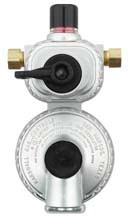
You should check all the tank and line connections periodically to be sure they are tight. When testing for leaks, a special propane liquid leak detector solution should be used. Do not use liquid soap as ammonia or chlorine in the liquid soap can damage the brass fittings. You should never use a match to look for leaks!
On dual tank installations where the tanks are mounted on the tongue, you should turn the tanks so the guard faces forward to help protect the valve and hoses from debris. This should also be a consideration for the mounting location of the regulator.
When tightening the POL nut (left
hand thread), use a proper size wrench and draw it up only snug, the new OPD
fitting only needs to be hand tightened to lock to the cylinder.
No pipe dope or tape is needed as the brass fitting makes the
seal. You should also turn on the valves and check the connections for leaks
with the proper solution any time the bottles have been disconnected.


The regulator is pretty much the
heart of the Propane system. There are a few things of interest and importance
about the regulator that you should know. The regulator should put out a
pressure of 11" water column. This is equivalent to 6.25 ounces per square inch
(of pressure). The regulator is adjustable and can be adjusted by a competent RV
technician with the proper equipment. You should be certain that the gauge
being used has been calibrated properly within the last month. This is very
important as incorrect pressures can cause major problems with the performance
of Propane appliances. This can also be a safety issue.
A regulator can vibrate while traveling and work its way out of adjustment. This
is the main reason it needs adjustment. A regulator properly adjusted should
operate at 11" water column while half the potential load is on the system. It
is also a good ideal to have the technician do a lock up pressure test on your
regulator. This will assure the regulator is shutting properly. A drop pressure
test at 8" water column for 5 minutes is how you would make certain you have no
leaks in your Propane system. To do this, you pressurize the system and close
the gas valve(s). Then with the manometer hooked up. You drop the pressure
(usually through a stove top burner valve) to 8" water column. After lowering to
8", you should let everything set for five minutes. Any drop from 8" would
indicate that gas is escaping. This could create a big bang. A rise from 8"
would indicate the valve on the tank is not closing completely. A very slight
rise is acceptable as this would simply be expansion due to heat. Most RV Safety
Education courses and owner manuals recommend these three tests annually.
Regulators have a vent on them. This vent should be pointed within 45 degrees of straight down. This will prevent water and debris from getting in and causing problems. All regulators should have a cover if they are not in a vented Propane compartment. This is according to RVIA code as is the 45 degrees thing.
A few more statements of importance about Propane gas:
1. High altitudes and low temperatures can have an adverse effect on the performance of Propane gas. One of the best ways to help alleviate this is to keep your tank(s) full in either of these situations.
2. Propane detectors can be set off by a number of things other than Propane gas. Some of these include:
Low battery voltage in the coach.
Hair sprays, deodorants and other aerosols.
Glues, perfumes, lacquer, gasoline and even alcoholic beverages.
Intestinal gases (Did that little dog do it?)
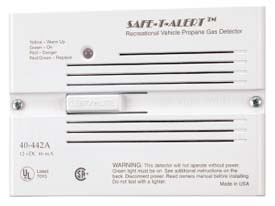

3. A low battery in your smoke detector can beep in such a manner that it sounds like your Propane detector.
4. You should never, under any circumstances, unhook the Propane detector. No more discussion.
5. A gallon of Propane has approximately 91,000 BTUs of heat. The amount of BTUs consumed by RV appliances is normally as follows:
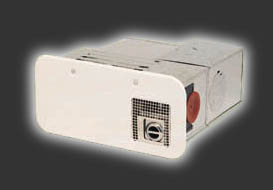
Heater - 12 to 45,000 BTUs per hour
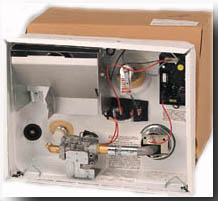
Water heater - 8,800 to 12,000 BTUs per hour
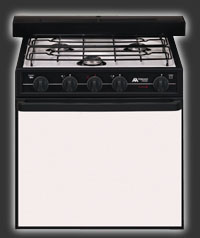
Oven - 7,100 BTUs per hour
Top Burner 5,500 to 9,100 BTUs per hour
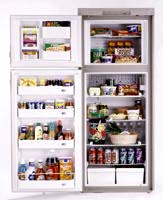
Refrigerator - 1,000 to 2,100 BTUs per hour
(While actually running)
6. There are recent changes in the laws concerning the valves on Propane bottles. A simplistic
comment on this is most towed recreation vehicles (97 or older) will need to
have the new OPD valves installed in order to be filled after April 1, 2002.
This does not generally apply to motorized RVs. '98 models are in a gray area.
All cylinders made after October 1, 1998, were required to have an OPD, this
generally means that '99 models and newer are okay. To tell if you have an OPD
valve, look at the top of the handle. It will have 3 legs and be marked OPD on
one of the legs if it is OPD. OPD will also be stamped on the stem below the
handle. OPD stands for Overfill Prevention Device. The idea is to keep someone
from filling the container too full which creates an undesirable situation.
7. You should use a POL plug or a cap when transporting Propane cylinders. Don't transport them inside the passenger compartment of your vehicle. The area must be properly vented.
Time and space dictate that I must conclude this writing. This is not at all intended to be a complete article on Propane. I have simply tried to address some of the problems and questions that I am most often exposed to in my shop.
Thank your for reading my article and enjoy your RV lifestyle.
Back to Motley RV Repair Home Page Back to Motley RV Repair RV Care/ Use Articles